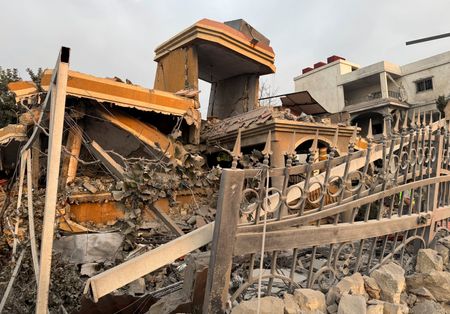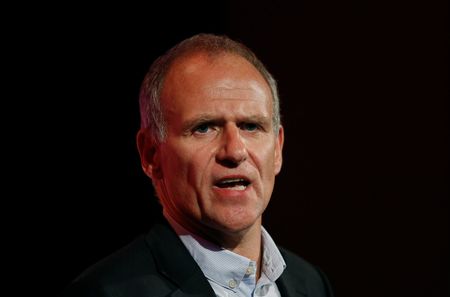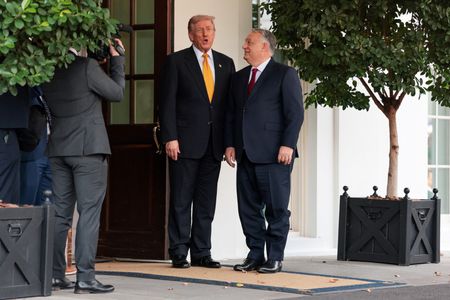By Maya Gebeily and Maayan Lubell
BEIRUT/JERUSALEM (Reuters) -Israel is pressing Lebanon’s army to be more aggressive in disarming the Iranian-backed militant group Hezbollah by searching private homes in the south for weaponry, three Lebanese security officials and two Israeli officials have said.
The demand has emerged in recent weeks and been rejected by Lebanon’s military leadership, who fear it would ignite civil strife and derail a disarmament strategy seen by the army as cautious but effective, the Lebanese security officials told Reuters.
The army is confident it can declare Lebanon’s south free of Hezbollah arms by the end of 2025, in line with a truce deal that ended a devastating Israeli war with Hezbollah last year.
A sweep of valleys and forests has located more than 50 tunnels and resulted in the confiscation of over 50 guided missiles and hundreds of other weapons, according to two Lebanese civilian sources briefed on army operations.
But the army’s plan never included searching private property, according to the Lebanese security officials. Israel doubts it will succeed without such measures.
LEBANESE AND ISRAELI ARMIES MONITOR CEASEFIRE
Two of the Lebanese security officials said Israel requested such raids in October meetings of the “Mechanism”, a U.S.-led committee bringing together Lebanese and Israeli officers to monitor implementation of the truce.
Shortly after, Israel stepped up ground operations and air strikes in southern Lebanon, which it said were targeting attempts by Hezbollah to re-arm.
Those strikes were seen as a clear warning that failure to search more intrusively could prompt a new full-blown Israeli military campaign, the Lebanese security officials said.
“They’re demanding that we do house-to-house searches, and we won’t do that … we aren’t going to do things their way,” one of the officials said.
Hezbollah has been severely weakened by the Israeli incursion and by Israeli and U.S. attacks on its backer Iran, but still wields enormous power among Shi’ites in Lebanon’s fragile sectarian-based system of governance.
All the sources declined to be named because of the sensitivity of the issue.
The Lebanese army declined to comment, in line with its usual media policies.
Israeli Prime Minister Benjamin Netanyahu’s office did not respond to a request for comment, but Netanyahu said on November 2: “We expect the Lebanese government to do what it committed to do, namely to disarm Hezbollah, but it is clear that we will exercise our right to self-defence as stipulated in the ceasefire conditions. We will not allow Lebanon to become a renewed front against us and will act as needed.”
LEBANON WANTS TO AVOID SHOWDOWN
Lebanon’s army fears that residents of the south would see house raids as subservience to Israel, which occupied south Lebanon for nearly two decades until 2000 before entering again last year, the Lebanese security officials said.
Beirut also worries that Israel will keep moving the goalposts, creating a permanent risk of escalatory strikes and undermining attempts to stabilise a country battered by geopolitical and economic upheavals, the security officials and a political official said.
But Israeli officials say Hezbollah is accelerating efforts to re-arm from properties in the south and further north, and that the Lebanese army is failing to confront it.
Israel passes intelligence on suspected Hezbollah depots to the Mechanism, which passes it to the Lebanese army to address. Israel has also taken direct action, notably against Hezbollah weapons transfers or when it deems Lebanese troops have not acted swiftly enough, an Israeli military official told Reuters.
The Lebanese security officials insist that new army checkpoints around the south are preventing Hezbollah from moving weapons.
Hezbollah denies it is rebuilding in the south.
It has not obstructed Lebanese army sweeps there and has not fired on Israel since last year’s ceasefire.
But it has also repeatedly refused to disarm fully. This week, it issued a public statement saying it has a “legitimate right” to defend Lebanon against Israel.
The Israeli military official said that Hezbollah wanted to remain a dominant force in Lebanon – a desire shared by Iran.
U.S. NUDGES LEBANON TOWARD TALKS
Beirut is also being urged by the United States to establish political channels with Israel to reach a lasting ceasefire and resolve their long-standing land border dispute.
“The path … needs to be to Jerusalem or Tel Aviv for a conversation,” U.S. envoy Thomas Barrack said at a security conference in Bahrain this month.
He suggested President Joseph Aoun “pick up the phone and call Netanyahu and say, ‘let’s end this garbage'”.
Aoun has said he is ready for talks, without saying whether he would consider direct contact. Hezbollah has rejected all negotiations, and the four Lebanese officials remained wary.
They pointed to Gaza and Syria, where Israel added last-minute conditions that halted progress towards ending conflict, and said its demand for house raids amounted to the same thing.
“The format doesn’t matter as much as the commitment,” the Lebanese political official said.
“Direct, indirect, the Mechanism, something else. Once there is Israeli commitment and U.S. guarantees, then we can start putting the pieces on the board.”
(Reporting by Maya Gebeily and Maayan Lubell; Additional reporting by Alexander Cornwell; Editing by Kevin Liffey)











